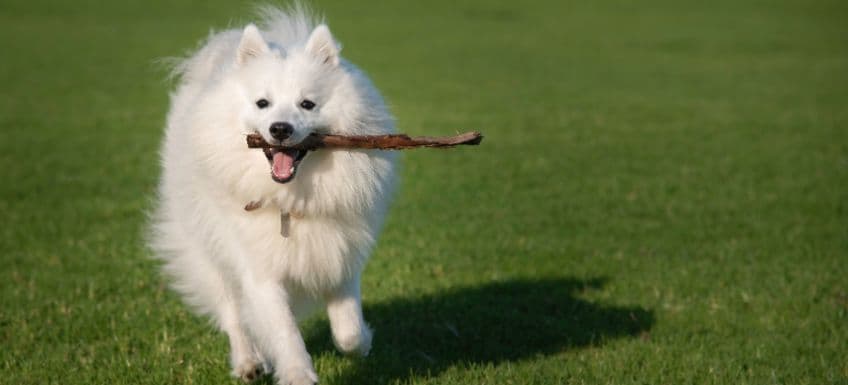The Japanese Spitz is a small, energetic breed known for its striking snow-white coat and fox-like features. Originally bred in Japan during the 1920s, these dogs were developed as companion animals, quickly becoming beloved for their loyalty, intelligence, and playful nature. With their fluffy, dense coats and bright, alert expressions, Japanese Spitz dogs are both charming and vigilant, making them excellent family pets and watchdogs. Their adaptability allows them to thrive in various living environments, from apartments to homes with yards, as long as they receive ample attention and exercise.
Japanese Spitz Dog Breed Facts & Characteristics
| Dog Breed Facts & Characteristics | Details |
|---|---|
| Origin | Japan, 1920s |
| Also known as | Nihon Supittsu, Nihon Spitz |
| Bred for | Companionship |
| Size | Small |
| Weight range | 5 to 10 kg |
| Height range | 30 to 38 cm |
| Colours | Pure white |
| Life expectancy | 12 to 14 years |
| Coat | Medium-thick, fluffy, and dense double coat |
| Temperament | Loyal, playful, intelligent |
| Exercise requirements | Moderate |
| Best suited for | Families, singles, apartment dwellers |
| Apartment friendly | Yes |
Personality
The Japanese Spitz is a loyal and playful breed that thrives on human companionship. Known for their intelligence and eagerness to please, these dogs are quick learners and respond well to positive reinforcement during training. Despite their small size, they have a bold personality and are not shy about expressing themselves, often using their unique bark to alert their owners to any unusual activity. Japanese Spitz dogs are excellent with children and generally get along well with other pets, making them an ideal choice for families. They are social by nature and enjoy being the center of attention, forming strong bonds with their owners.
Grooming
The Japanese Spitz has a beautiful, dense double coat that requires regular grooming to maintain its pristine condition. Brushing their coat several times a week is essential to prevent matting and to manage shedding, especially during seasonal changes when they shed more heavily. A slicker brush is recommended to reach the undercoat and remove loose fur effectively. Additionally, regular ear cleaning, nail trimming, and dental care should be part of their grooming routine. While the Japanese Spitz is generally clean and odor-free, occasional baths using a mild dog shampoo can help keep their coat looking fresh and fluffy.
Feeding
Feeding a Japanese Spitz requires attention to their dietary needs to maintain their health and energy levels. Fortunately, Japanese Spitz dogs are not particularly fussy eaters, making it easier to provide them with a balanced diet. Due to their small size, it's important to feed them small, measured portions of high-quality dog food that is appropriate for their age, size, and activity level. Puppies should be fed a diet formulated for small breeds to support their growth, with meals divided into three portions throughout the day. As they transition to adulthood, typically around one year of age, their diet should gradually shift to an adult dog food designed for small breeds. Monitoring their weight and adjusting portion sizes as needed is crucial to prevent obesity, a common issue in small dogs. Always ensure that your Japanese Spitz has access to fresh, clean water, and avoid overfeeding treats.
Common Health Concerns
The Japanese Spitz is generally a healthy breed, but like all dogs, they can be prone to specific health issues. Some of the most common concerns include hip dysplasia, a condition that affects the joints and can lead to discomfort or mobility issues as the dog ages. Patellar luxation, where the kneecap slips out of place, is another condition seen in this breed. Additionally, some Japanese Spitz dogs may develop progressive retinal atrophy (PRA), a genetic eye disorder that can lead to blindness over time. Regular veterinary check-ups are essential to catch these conditions early and manage them effectively. Maintaining a healthy diet, regular exercise, and a consistent grooming routine can also contribute to your Japanese Spitz's overall well-being.
Did You Know?
The Japanese Spitz is an exceptionally clean breed, known for their cat-like grooming routines and their tendency to avoid puddles and dirt entirely just to keep their white coats flawless. Despite their fluffy appearance, their coats are surprisingly low-maintenance due to a unique texture that repels dirt and water, making it easier to maintain their pristine look with minimal effort.
FAQs
How much does a Japanese Spitz cost in Australia?
The cost of a Japanese Spitz in Australia typically ranges from AUD $2,500 to $4,500, depending on factors such as the breeder's reputation, the dog's lineage, and whether the dog is of show quality.
Are Japanese Spitz dogs good with children?
Yes, Japanese Spitz dogs are known for their gentle and affectionate nature, making them great companions for children. They are playful and enjoy interacting with kids, though supervision is recommended with very young children to ensure gentle handling.
How much exercise does a Japanese Spitz need?
Japanese Spitz dogs have moderate exercise needs. A daily walk combined with some playtime is usually sufficient to keep them happy and healthy. They enjoy mental stimulation, so puzzle toys and training sessions are also beneficial.
Do Japanese Spitz dogs shed a lot?
Yes, the Japanese Spitz has a double coat that sheds moderately throughout the year, with more intense shedding during seasonal changes. Regular brushing is essential to manage shedding and keep their coat in good condition.
Are Japanese Spitz dogs suited for cold or hot climates?
Japanese Spitz dogs are well-suited to colder climates, thanks to their thick double coat, which provides excellent insulation. While they can handle cooler weather, they actually prefer the comfort of being indoors during the winter months, unlike some of their Spitz counterparts. They can also adapt to warmer environments but are sensitive to heat. It’s essential to keep them cool by ensuring they have access to shade, fresh water, and limiting outdoor activities during the hottest parts of the day.
Are Japanese Spitz dogs easy to train?
Yes, Japanese Spitz dogs are intelligent and eager to please, making them relatively easy to train. They respond well to positive reinforcement techniques, such as treats and praise.
Can Japanese Spitz dogs live in apartments?
Yes, Japanese Spitz dogs are adaptable and can live comfortably in apartments, provided they receive enough exercise and mental stimulation. They are generally quiet indoors but may bark to alert their owners to any unusual activity.
How long do Japanese Spitz live?
The Japanese Spitz typically has a lifespan of 12 to 14 years, though with proper care, some may live even longer. Regular veterinary care, a balanced diet, and an active lifestyle contribute to their longevity.





























